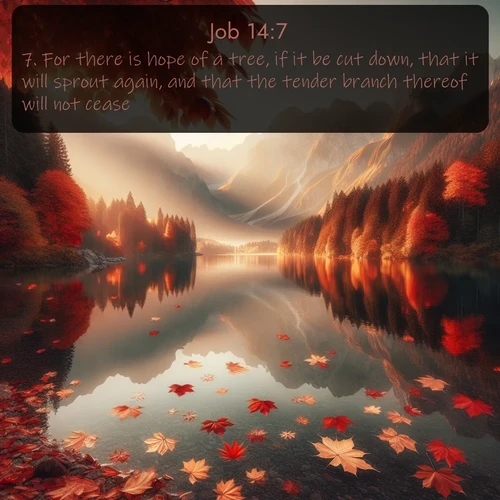Job 14:7 plusieurs versions / traductions
English Bible Translations
7. For there is hope of a tree, if it be cut down, that it will sprout again, and that the tender branch thereof will not cease.
7. For there is hope of a tree, If it be cut down, that it will sprout again, And that the tender branch thereof will not cease.
7. For there is hope of a tree; if it is cut down, it will come to life again, and its branches will not come to an end.
7. For there is hope for a tree: if it be cut down, it will sprout again, and its tender branch will not cease;
7. For there is hope of a tree, if it is cut down, that it will sprout again, and that its tender branch will not cease.
7. For there is of a tree hope, if it be cut down, That again it doth change, That its tender branch doth not cease.
German Bible Translations
7. Ein Baum hat Hoffnung, wenn er schon abgehauen ist, daß er sich wieder erneue, und seine Schößlinge hören nicht auf.
7. Denn für einen Baum ist Hoffnung vorhanden: wird er abgehauen, so sproßt er wieder, und sein Schößling bleibt nicht aus.
French Bible Translations
7. »En effet, pour un arbre il y a de l'espérance: quand on le coupe, il repousse et il produit encore des rejetons;
7. Un arbre a de l’espérance: Quand on le coupe, il repousse, Il produit encore des rejetons;
7. Un arbre a de l'espérance: Quand on le coupe, il repousse, Il produit encore des rejetons;
7. Car il y a de l'espoir pour un arbre: s'il est coupé, il repoussera encore, et ses rejetons ne cesseront pas.
7. Car si un arbre est coupé, il y a de l'espérance, et il poussera encore, et ne manquera pas de rejetons;
7. Car il y a de l'espérance pour l'arbre, si on l'a coupé; il reverdit encore, et il ne cesse pas d'avoir des rejetons;
Versions with Strong Codes
Job 14 / KJV_Strong7.
Strong Code definitions
H3588 kiy kee a primitive particle (the full form of the prepositional prefix) indicating causal relations of all kinds, antecedentor consequent; (by implication) very widely used as a relative conjunction or adverb (as below); often largely modified by other particles annexed:--and, + (forasmuch, inasmuch, where-)as, assured(-ly), + but, certainly, doubtless, + else, even, + except, for, how, (because, in, so, than) that, + nevertheless, now, rightly, seeing, since, surely, then, therefore, + (al- )though, + till, truly, + until, when,whether, while, whom, yea, yet.
H3426 yesh yaysh perhaps from an unused root meaning to stand out, or exist; entity; used adverbially or as a copula for the substantive verb (1961); there is or are (or any other form of the verb to be, as may suit the connection):--(there) are, (he, it, shall, there, there may, there shall, there should) be, thou do, had, hast, (which) hath, (I, shalt, that) have, (he, it, there) is, substance, it (there) was, (there) were, ye will, thou wilt, wouldest.see H1961
H8615 tiqvah tik-vaw' from H6960; literally, a cord (as an attachment (compare 6961)); figuratively, expectancy:--expectation ((-ted)), hope, live, thing that I long for.see H6960 see H6961
H6086 `ets ates from H6095; a tree (from its firmness); hence, wood (plural sticks):--+ carpenter, gallows, helve, + pine, plank, staff, stalk, stick, stock, timber, tree, wood.see H6095
H518 'im eem a primitive particle; used very widely as demonstrative, lo!; interrog., whether?; or conditional, if, although; also Oh that!, when; hence, as a negative, not:--(and, can-, doubtless, if, that) (not), + but, either, + except, +more(-over if, than), neither, nevertheless, nor, oh that, or,+ save (only, -ing), seeing, since, sith, + surely (no more, none, not), though, + of a truth, + unless, + verily, when, whereas, whether, while, + yet.
H3772 karath kaw-rath' a primitive root; to cut (off, down or asunder); by implication, to destroy or consume; specifically, to covenant (i.e. make an alliance or bargain, originally by cutting flesh and passing between the pieces):--be chewed, be feller, be freed, hew (down), make a league ((covenant)), X lose, perish, X utterly, X want.
H2498 chalaph khaw-laf' a primitive root; properly, to slide by, i.e. (by implication) to hasten away, pass on, spring up, pierce orchange:--abolish, alter, change, cut off, go on forward, grow up, be over, pass (away, on, through), renew, sprout, strike through.
H5750 `owd ode or rod {ode}; from H5749; properly, iteration or continuance; used only adverbially (with or without preposition), again, repeatedly, still, more:--again, X all life long, at all, besides, but, else, further(-more), henceforth, (any) longer, (any) more(-over), X once, since, (be) still, when, (good, the) while (having being), (as, because, whether, while) yet (within).see H5749
H3127 yowneqeth yo-neh'-keth feminine of H3126; a sprout:--(tender) branch, young twig.
H3808 lo' lo or lowi {lo}; or loh (Deut. 3:11) {lo}; a primitive particle; not (the simple or abs. negation); by implication, no; often used with other particles (as follows):--X before, + or else, ere, + except, ig(-norant), much, less, nay, neither, never, no((-ne), -r, (-thing)), (X as though...,(can-), for) not (out of), of nought, otherwise, out of, + surely, + as truly as, + of a truth, + verily, for want, + whether, without.
H2308 chadal khaw-dal' a primitive root; properly, to be flabby, i.e. (by implication) desist; (figuratively) be lacking oridle:--cease, end, fall, forbear, forsake, leave (off), let alone, rest, be unoccupied, want.
Prédications qui analysent les thèmes Job 14
Thèmes : L'homme est fragile ; La mort inévitable ; Espoir en DieuRelated Sermons discussing Job 14
Themes : L'homme est fragile ; La mort inévitable ; Espoir en Dieusee also: Bible Key Verses ; KJV Bible Images, BBE Bible images

